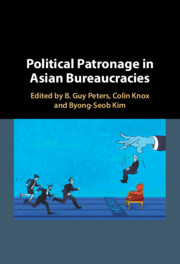Book contents
- Political Patronage in Asian Bureaucracies
- Political Patronage in Asian Bureaucracies
- Copyright page
- Contents
- Figures
- Tables
- Contributors
- Abbreviations
- 1 Patronage in Asian Political Systems
- Part I One-Party Dominated Systems
- Part II Two-Party/Multi-Party Systems
- 5 Patronage Appointment in Japanese Politics
- 6 Patronage in Mongolia
- 7 Loyalty or Expertise? The Practice of Political Patronage in Taiwan
- 8 Political Appointments in South Korea
- 9 Patronage Appointments in the Philippine Public Service
- Part III Autocracies
- Index
- References
9 - Patronage Appointments in the Philippine Public Service
from Part II - Two-Party/Multi-Party Systems
Published online by Cambridge University Press: 05 October 2023
- Political Patronage in Asian Bureaucracies
- Political Patronage in Asian Bureaucracies
- Copyright page
- Contents
- Figures
- Tables
- Contributors
- Abbreviations
- 1 Patronage in Asian Political Systems
- Part I One-Party Dominated Systems
- Part II Two-Party/Multi-Party Systems
- 5 Patronage Appointment in Japanese Politics
- 6 Patronage in Mongolia
- 7 Loyalty or Expertise? The Practice of Political Patronage in Taiwan
- 8 Political Appointments in South Korea
- 9 Patronage Appointments in the Philippine Public Service
- Part III Autocracies
- Index
- References
Summary
Generally and ideally, recruitment and appointment to the Civil Service or public sector in the Philippines should be based on merit and fitness. However, political appointments by the Executive, particularly by the President of the Republic, for positions that are policy determining, primarily confidential, or highly technical in nature are ‘allowed’. This political appointment is construed as patronage appointment and perceived to be abused. Recent reports point to the growing politicization of this appointment process, with no meaningful means for vetting presidential appointees to ensure they meet the criteria and have the required qualifications for the positions to which they are appointed. We investigate patronage appointment at the third tier of the Philippine civil service and describe the policy-patronage dynamics over historical period. It also attempts to conceptualize a typology of roles and relationships between the patron and the appointees based on Peters typology. This challenging research could provide the bases for future studies on patronage politics in the public sector, their implications and effects on the bureaucracy, public policy, and development.
Keywords
- Type
- Chapter
- Information
- Political Patronage in Asian Bureaucracies , pp. 199 - 228Publisher: Cambridge University PressPrint publication year: 2023

